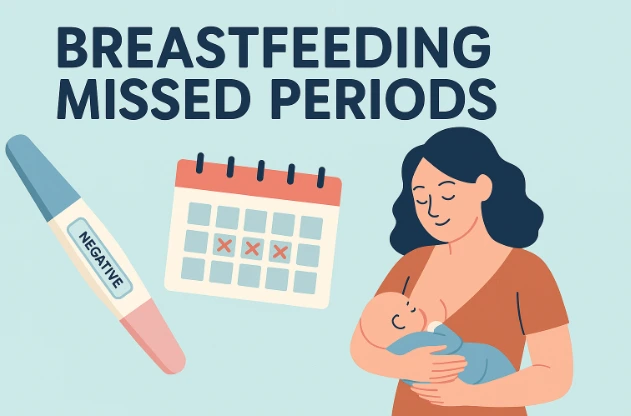Many new mothers experience a mix of surprise and concern when their periods don’t return for months after giving birth, especially if they are breastfeeding. The immediate thought for many is: Am I pregnant again? If you’re dealing with a missed period while nursing and have taken a negative pregnancy test, you’re not alone. Let’s explore this topic in detail so that you can understand what’s going on in your body and what to expect moving forward.
Why Haven’t My Periods Returned After Childbirth?
One of the most common reasons for missed periods during the postpartum period is lactational amenorrhea – the natural absence of menstruation due to breastfeeding. This is primarily caused by a hormone called prolactin, which plays a central role in milk production.
What Is Prolactin and What Does It Do?
Prolactin is a hormone secreted by the pituitary gland. Its main function is to stimulate milk production in breastfeeding mothers. The more frequently you breastfeed, the more prolactin your body produces. As prolactin levels rise, another hormone – GnRH (Gonadotropin-releasing hormone) – gets suppressed. This hormone is essential for triggering ovulation, which is the release of an egg from the ovaries each month. No ovulation = no period.
This hormonal mechanism is nature’s way of giving the body time to recover before conceiving again. It’s a natural birth spacing method that works best when a mother is exclusively breastfeeding.
Is It Normal to Miss Periods for Several Months While Breastfeeding?
Yes, it’s entirely normal. Some women get their periods back as early as 6 weeks after delivery, while others may not menstruate for 6 months to a year. The timeline depends on several factors:
- Exclusivity of breastfeeding: The more your baby nurses, the higher your prolactin levels remain.
- Nighttime feedings: Feeding your baby at night helps maintain high prolactin levels.
- Baby’s age and feeding pattern: As your baby starts sleeping through the night or eating solids, feeding frequency decreases, lowering prolactin and allowing ovulation to return.
How Long Can I Go Without a Period While Breastfeeding?
It varies, but generally:
| Breastfeeding Pattern | Menstrual Return Likely |
|---|---|
| Exclusive breastfeeding | 4-6 months or later |
| Mixed feeding (breast + formula) | 2-4 months |
| Minimal or no breastfeeding | 6-8 weeks postpartum |
Can I Get Pregnant Even If I Haven’t Had My Period?
Yes, and this is where many women get confused. The absence of periods doesn’t necessarily mean the absence of fertility. Here’s why:
- Ovulation happens before menstruation.
- You can ovulate without knowing it, especially if your period hasn’t returned yet.
- If you have unprotected sex around the time of ovulation, pregnancy can occur.
So, even if you haven’t seen your period since childbirth, your body can still release an egg and you can conceive. That’s why relying solely on breastfeeding as a method of birth control isn’t entirely foolproof.
The Lactational Amenorrhea Method (LAM)
LAM is a natural form of contraception that can be up to 98% effective but only under specific conditions:
- Your baby is less than 6 months old.
- You are exclusively breastfeeding (no solids, formula, or long breaks between feeds).
- You haven’t had a postpartum period yet.
Once any of these conditions change, LAM becomes less reliable, and you should consider other contraceptive options if you want to avoid pregnancy.
Negative Pregnancy Test but Still No Period: What Could Be Happening?
You might find yourself taking a pregnancy test after three missed periods, only for the result to come back negative. While this can feel confusing, there are several explanations:
- Hormonal changes: Prolactin is still high enough to delay ovulation.
- Stress or fatigue: The demands of new motherhood can also affect your cycle.
- Changes in feeding frequency: If your baby is still nursing frequently, this could delay your period even longer.
As long as you feel healthy and are not experiencing unusual symptoms (like severe abdominal pain, prolonged bleeding, or signs of thyroid issues), missing your period for several months while breastfeeding is usually not a cause for concern.
When Should I Be Concerned About a Missed Period?
There are some situations when a missed period warrants medical attention:
- More than 6 months postpartum and not breastfeeding frequently
- Symptoms of hormonal imbalance (e.g., excessive hair loss, acne, mood swings)
- Signs of possible pregnancy despite negative tests
- Irregular bleeding or spotting for weeks without a full period
- History of reproductive issues like PCOS
If any of these apply, it’s best to consult a healthcare provider. They may perform a blood test, hormone analysis, or ultrasound to ensure everything is in balance.
When Will My Period Return?
This is one of the most unpredictable aspects of postpartum recovery. Here’s a rough idea based on feeding patterns:
| Baby’s Feeding Schedule | Likely Menstrual Timeline |
| Exclusively breastfed | 4-12 months postpartum |
| Weaning underway | Within 4-8 weeks of weaning |
| Formula-fed from beginning | 6-8 weeks postpartum |
Everyone is different, and your return to menstruation could happen earlier or later. The key is to listen to your body and keep an open line of communication with your healthcare provider.
Should I Use Birth Control While Breastfeeding?
If you are sexually active and want to avoid pregnancy, then yes. There are safe contraceptive options for breastfeeding mothers:
- Mini-pill (progestin-only pill)
- Hormonal IUDs (e.g., Mirena)
- Non-hormonal IUDs (e.g., copper IUD)
- Barrier methods (condoms, diaphragms)
- Natural family planning (with caution)
Talk to your doctor about what method is safest and most effective for your situation.
Common Myths About Breastfeeding and Periods
Let’s clear up some common misunderstandings:
- “I can’t get pregnant if I’m breastfeeding.” Not true. Breastfeeding may reduce the chance but doesn’t eliminate it.
- “My period won’t return until I stop nursing.” Some women get periods while still nursing frequently.
- “A negative pregnancy test means I’m not pregnant.” Usually true, but testing too early or using a faulty test can lead to false negatives.
In Summary
- Breastfeeding can delay your period due to high prolactin levels, which suppress ovulation.
- Missing your period for months while nursing is normal and not necessarily a sign of pregnancy.
- Pregnancy is still possible without a period because ovulation can happen first.
- A negative pregnancy test doesn’t always rule out pregnancy, but if multiple tests are negative, it’s likely due to hormonal suppression.
- Contraceptive planning is important if you wish to avoid another pregnancy while breastfeeding.
- Consult your doctor if your period hasn’t returned after 6 months postpartum or if you have any unusual symptoms.
Motherhood comes with enough worries—don’t let missed periods add unnecessary stress. With the right information and support, you can focus on what matters most: your health and your baby’s well-being.

